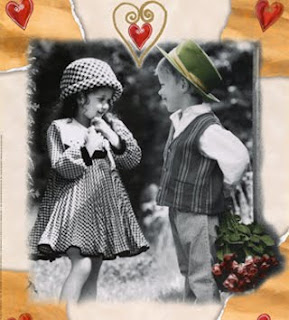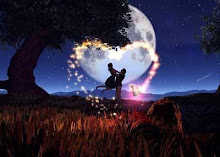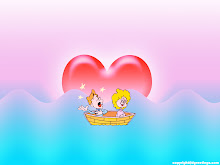Thursday, November 5, 2009
Love Quotes
Posted by Azka Tauqir at Thursday, November 05, 2009 0 comments
Tuesday, November 3, 2009
English Love poems...
Seems like yesterday
Each time I close my eyes
Your laughter ringing my ears
Your sweet words pricks me like ice
This is felt by me only
The romantic anger in thee
The songs sung to court me
Those magic moments exceptionally
Second inning of my life
Started with your entrance
Din’t know i deserve You
But i know my love is true
No loneliness was felt in crowd
Though all eyes were only on us
Jealousy exists every where
But your arms assured me much
and those hands, your beautiful hands
and that heart of yours
how the chains you have on me
and even if i were free
id cry and beg
so forever and ever
I love you with all my heart
I feel you are my one true love
Now you are gone, my world is incomplete
The way you made me
My thoughts, my dreams, you re always there,
The further you drift away from me,
My love and friendship is always here,
Each one of us has a true love, so I am told
Enduring and endless, our love will remain
only hell lays at the bottom
I was confused of who I was
you took off all the make-up
you saw my first smile
you poured me out
Every-time I go to sleep.
‘Cause everyday I think about you.
I wish when I said it it would always come true,
Let me make one last mistake just to let it all show,
I’ve tried so hard to fight these feelings,
I know I should move on,
Tomorrow i’ll again try to forget you,
Ascent of sun makes changes,
Dead turned to the Sirius,
Moving nonstop in the space,
Darkness clothes on Heaven rim,
Every thought of the knight,
Reincarnation of light,
The petals
In silence
Your eyes send electricity down my spine
And when the butterflies in my stomach overtook me
You need to know how much you complete me
You fill me, all the time,and it keeps getting better.
I love you so much, that I cannot describe
Our love gets stronger as the orange sun goes down.
Secretly whispering, words so true,
It’s been so longsince
I squeeze my pillow tightand
I just wish my memory
Trust is something I do not have
I’m reaching out for help
A dream made reality
Your face lights up
Sweet Love,Follow the wind and the flowers.
Sweet Love,Decipher my enigmas,
True love
True love
True loveLasting beyond the end
Lovers cant reach through this opaque screen
Words written are easily misunderstood
This experience I undergo each day
Posted by Azka Tauqir at Tuesday, November 03, 2009 0 comments
Labels: Best love poems, English Love poems, Love poem, Love poetry
Saturday, October 31, 2009
Symbols of Love....
Heart
Posted by Azka Tauqir at Saturday, October 31, 2009 0 comments
Labels: Heart a symbol of love, love symbol
Wednesday, October 28, 2009
Best Love Story of The Month...
She was not even aware of the word attraction....
She had no idea about what love can be....
The madness of love,the sadness of love,the happiness of love,ignorance of the lover,attitude of that person....
She always used to make fun of her friends who used to tell her about their feelings....
She thought no such feeling exists....
One day when she made fun of one of her friends....
Her friend cursed her that may GOD make her suffer through the same situation....
And the very next day things for her changed....
It was raining heavily....
She saw a 28year old guy walking in the street in the heavy rain fall....
And the girl who never even thought of talking to handsome guys those were mad about her....
Fell in love with the normal face man with a huge difference of age between them....
This was love at first site....
Not even knowing the name of the guy....
Thinking about him day & night....
With lot of efforts she got the contact number of that person....
And started talking to him.....
Not telling him that she was his neighbor.....
A girl who never used to tolerate attitude she got used to it.....
She was truly in love....
And was able to sense out every feeling of love.....
How ever the guy behaved she yet expressed love....
Then the day came when she had to desolation and dejection.....
As the guy she loved got married to some other girl.....
A long time has passed.....
He has a baby boy.....
But the girl is still in love with him....
She yet looks at him through her window when he comes back from his office.....
But she cant disclose her feelings anymore.....
They are unsaid silent feelings which just her heart knows....
Now she knows that there is no control on heart....
And what is love.....
What are the feelings of love.....
And love does not sees who the person is,how he/she is it just happens.....
The person leaves you but the memories of love store a place in your heart forever & ever.....
Posted by Azka Tauqir at Wednesday, October 28, 2009 0 comments
Labels: Best love stories, Love story of the month, Real life love stories, Touching love stories
Different Emotions of Love...
There are Four different emotions of love...
1)Eroticism...
2)Platonic love...
3)Familial love...
4)Romance...

In sociology, storge is a type of affinity or natural affection felt between members of a group bound by common ancestry or blood ties, or through friendship and care. Familial love can also be experienced through kindhearted teachers to their students too. The cultural ideal of familial love is one that is committed, unconditional, selfless, emotionally full, and reciprocally returned by the other.It is not necessary for anybody to be actually related by blood relationship to develop this type of love towards anyone. Simply, it can be felt towards any one with whom one is sharing one's time.
"Then plainly know my heart's dear love is set On the fair daughter of rich Capulet: As mine on hers, so hers is set on mine; And all combined, save what thou must combine By holy marriage: when and where and how We met, we woo'd and made exchange of vow, I'll tell thee as we pass; but this I pray, That thou consent to marry us to-day." --Romeo and Juliet, Act II, Scene IIRomantic love, however, may also be classified according to two categories, "popular romance" and "divine"(or "spiritual") romance. Popular romance may include but is not limited to the following types: idealistic, normal intense (such as the emotional aspect of "falling in love"), predictable as well as unpredictable, consuming (meaning consuming of time, energy and emotional withdrawals and bids), intense but out of control (such as the aspect of "falling out of love") material and commercial (such as societal gain mentioned in a later section of this article), physical and sexual, and finally grand and demonstrative. Divine (or spiritual) romance may include, but is not limited to these following types: realistic, as well as plausible unrealistic, optimistic as well as pessimistic (depending upon the particular beliefs held by each person within the relationship.), abiding (e.g. the theory that each person had a predetermined stance as an agent of choice; such as "choosing a husband" or "choosing a soul mate."), non-abiding (e.g. the theory that we do not choose our actions, and therefore our romantic love involvement has been drawn from sources outside of ourselves), predictable as well as unpredictable, self control (such as obedience and sacrifice within the context of the relationship) or lack thereof (such as disobedience within the context of the relationship), emotional and personal, soulful (in the theory that the mind, soul, and body, are one connected entity), intimate, and infinite (such as the idea that love itself or the love of a god or God's "unconditional" love is or could be everlasting, if particular beliefs were, in fact, true.)
- Holding hands or walking hand in hand
- Private conversations (including distant ones over the phone, by written communication or even internet)
- Sleeping together
- Physical intimacy
Tragedy and other social issues of romance
- It cannot be easily controlled.
- It is not overtly (initially at least) predicated on a desire for sex as a physical act.
- If requited, it may be the basis for lifelong commitment.
Posted by Azka Tauqir at Wednesday, October 28, 2009 0 comments
Labels: Eroticism, Familial love, Platonic love, Romance
Tuesday, October 27, 2009
Type of Love...
There are two types of love...
1)Impersonal love...
2)Interpersonal love...
A person can be said to love a country, principle, or goal if they value it greatly and are deeply committed to it. Similarly, compassionate outreach and volunteer workers' "love" of their cause may sometimes be borne not of interpersonal love, but impersonal love coupled with altruism and strong political convictions. People can also "love" material objects, animals, or activities if they invest themselves in bonding or otherwise identifying with those things. If sexual passion is also involved, this condition is called paraphilia.

Interpersonal love refers to love between human beings. It is a more potent sentiment than a simple liking for another. Unrequited love refers to those feelings of love that are not reciprocated. Interpersonal love is most closely associated with interpersonal relationships. Such love might exist between family members, friends, and couples. There are also a number of psychological disorders related to love, such as erotomania.Throughout history, philosophy and religion have done the most speculation on the phenomenon of love. In the last century, the science of psychology has written a great deal on the subject. In recent years, the sciences of evolutionary psychology, evolutionary biology, anthropology, neuroscience, and biology have added to the understanding of the nature and function of love. Interpersonal attraction is the attraction between people which leads to friendships and romantic relationships. The study of interpersonal attraction is a major area of research in social psychology. Interpersonal attraction is related to how much we like, love, dislike, or hate someone. It can be viewed as a force acting between two people that tends to draw them together and resist their separation. When measuring interpersonal attraction, one must refer to the qualities of the attracted as well as the qualities of the attractor to achieve predictive accuracy. It is suggested that to determine attraction, personality and situation must be taken into account. Repulsion is also a factor in the process of interpersonal attraction, one's conception of "attraction" to another can vary from extreme attraction to extreme repulsion.CausesMany factors leading to interpersonal attraction have been studied. The most frequently studied are: physical attractiveness, propinquity, familiarity, similarity, complementarity, reciprocal liking, and reinforcement.
According to Rowland Miller's Intimate Relationships text, the propinquity effect can be defined as: "the more we see and interact with a person, the more likely he or she is to become our friend or intimate partner." This effect is very similar to the mere exposure effect in that the more a person is exposed to a stimulus, the more the person likes it; however, there are a few exceptions to the mere exposure effect.
Mere Exposure/Exposure Effect
As mentioned above, the mere exposure effect, also known as the familiarity principle, states that the more we are exposed to something, the more we come to like it. This applies equally to both objects and people (Miller, 2006). The few exceptions to this effect include the social allergy effect and twincest avoidance e.g John and Edward X-Factor 2009 (Miller, 2006). The social allergy effect occurs when a person's annoying habits grow worse over time, instead of growing more fond of his or her idiosyncrasies.
Similarity
The notion of “birds of a feather flock together” points out that similarity is a crucial determinant of interpersonal attraction. According to Morry’s attraction-similarity model (2007), there is a lay belief that people with actual similarity produce initial attraction. Perceived similarity develops for someone to rate others as similar to themselves in on-going relationship. Such perception is either self-serving (friendship) or relationship-serving (romantic relationship). Newcomb (1963) pointed out that people tend to change perceived similarity to obtain balance in a relationship. Additionally, perceived similarity was found to be greater than actual similarity in predicting interpersonal attraction.
Findings suggest that interpersonal similarity and attraction are multidimensional constructs (Lydon, Jamieson & Zanna, 1988), in which people are attracted to others who are similar to them in demographics, physical appearance, attitudes, interpersonal style, social and cultural background, personality, interests and activities preferences, and communication and social skills. A study conducted by Theodore Newcomb (1961) on college dorm roommates suggested that individuals with shared backgrounds, academic achievements, attitudes, values, and political views became friends.
- Physical appearance
The matching hypothesis proposed by Goffman (1952) suggests why people become attracted to their partner. It claims that people are more likely to form long standing relationships with those who are equally physically attractive as they are. It can be represented in the following equation: physical attractiveness x the probability of acceptance[clarification needed] (Miller, 2006). The study by Walster and Walster (1969) supported the matching hypothesis by showing that partners who were similar in terms of physical attractiveness expressed the most liking for each other. Murstein (1972) also found evidence that supported the matching hypothesis: photos of dating and engaged couples were rated in terms of attractiveness. A definite tendency was found for couples of similar attractiveness to date or engage. - Attitudes
According to the ‘law of attraction’ by Byrne (1971), attraction towards a person is positively related to the proportion of attitudes similarity associated with that person. Clore (1976) also raised that the one with similar attitudes as yours was more agreeable with your perception of things and more reinforcing s/he was, so the more you like him/her. Based on the cognitive consistency theories, difference in attitudes and interests can lead to dislike and avoidance (Singh & Ho, 2000; Tan & Singh, 1995) whereas similarity in attitudes promotes social attraction (Byrne, London & Reeves, 1968; Singh & Ho, 2000). Miller (1972) pointed out that attitude similarity activates the perceived attractiveness and favorability information from each other, whereas dissimilarity would reduce the impact of these cues. The studies by Jamieson, Lydon and Zanna (1987, 1988) showed that attitude similarity could predict how people evaluate their respect for each other, and social and intellectual first impressions which in terms of activity preference similarity and value-based attitude similarity respectively. In intergroup comparisons, high attitude similarity would lead to homogeneity among in-group members whereas low attitude similarity would lead to diversity among in-group members, promoting social attraction and achieving high group performance in different tasks (Hahn & Hwang, 1999). Although attitudinal similarity and attraction are linearly related, attraction may not contribute significantly to attitude change (Simons, Berkowitz & Moyer, 1970) - Social and cultural background
Byrne, Clore and Worchel (1966) suggested people with similar economic status are likely to be attracted to each other. Buss & Barnes (1986) also found that people prefer their romantic partners to be similar in certain demographic characteristics, including religious background, political orientation and socio-economic status. - Personality
Researchers have shown that interpersonal attraction was positively correlated to personality similarity (Goldman, Rosenzweig & Lutter, 1980). People inclined to desire romantic partners who are similar to themselves on agreeableness, conscientiousness, extroversion, emotional stability, openness to experience (Botwin, Buss, & Shackelford, 1997), and attachment style (Klohnen & Luo, 2003). - Interests and activities
Activity similarity was especially predictive of liking judgments, which affects the judgments of attraction (Lydon, Jamieson & Zanna, 1988). Lydon and Zanna (1987, 1988) claimed that high self-monitoring people were influenced more by activity preference similarity than attitude similarity on initial attraction, while low self-monitoring people were influenced more on initial attraction by value-based attitude similarity than activity preference similarity. - Social skills
According to the post-conversation measures of social attraction, tactical similarity was positively correlated with partner satisfaction and global competence ratings, but was uncorrelated with the opinion change and perceived persuasiveness measures (Waldron & Applegate, 1998).
Reasons of spouse similarity (Watson et al., 2004)
Effects of similarity on interpersonal attraction
Similarity has effects on starting a relationship by initial attraction to know each other. It is showed that high attitude similarity resulted in a significant increase in initial attraction to the target person and high attitude dissimilarity resulted in a decrease of initial attraction (Gutkin, Gridley & Wendt, 1976; Kaplan & Olczak, 1971). Besides, similarity also promotes relationship commitment. Study on heterosexual dating couples found that similarity in intrinsic values of the couple was linked to relationship commitment and stability (Kurdek & Schnopp-Wyatt, 1997).
Complementarity
The model of complementarity explains whether "birds of a feather flock together" or "opposites attract".Studies show that complementary interaction between two partners increases their attractiveness to each other (Nowicki and Manheim, 1991). Complementary partners preferred closer interpersonal relationship than non-complementary ones (Nowicki & Manheim,1991). Couples who reported the highest level of loving and harmonious relationship were more dissimilar in dominance than couples who scored lower in relationship quality. (Markey & Markey (2007)).Mathes and Moore (1985) found that people were more attracted to peers approximating to their ideal self than to those who did not. Specifically, low self-esteem individuals appeared more likely to desire a complementary relationship than high self-esteem people. We are attracted to people who complement to us because this allows us to maintain our preferred style of behavior (Markey & Markey (2007), and through interaction with someone who complements our own behavior, we are likely to have a sense of self-validation and security (Carson, 1969).
Similarity or Complementarity?
Social Exchange Theory
People's feelings toward a potential partner are dependent on their perception of rewards and costs, the kind of relationships they deserve, and their likelihood for having a healthier relationship with someone else. Rewards are the part of a relationship that makes it worthwhile and enjoyable. A cost is something that can cause irritation like a friend overstaying his welcome. Comparison level is also taken into account during a relationship. This suggests that people expect rewards or costs depending on the time invested in the relationship. If the level of expected rewards are minimal and the level of costs is high, the relationship suffers and both parties may become dissatisfied and unhappy. Lastly, the comparison of alternatives means that satisfaction is conditional on the chance that a person could replace the relationship with a more desirable one.
Attraction = Friendship
Warren Kubitschek and Maureen Hallinan, University of Notre Dame, social psychologists who suggested that attraction is the result of the propinquity and similarity effects and the status of each party involved. Their study was about the tracking program that organizes students according to their level of ability to learn. This is mostly implemented in middle and almost all of high school. Their goal is to prove that students on the same track have a higher probability of becoming friends compared to those in different tracks. Other organizational based groupings should also follow these factors. The propinquity effect creates an ideal environment where students are in close physical proximity with each other and have the chance to build familiarity that leads to friendship. Similarity in tracking students is important because they found that track students tend to become friends with others who have the same academic achievement and expectations as themselves. They also found that students on the same level of status concerning grades will likely name them than those who are on lower level than their own. They conclude that although the factors mentioned do have great influence on friendship, they are not exclusive for organized program like tracking.
Attraction = Romantic Relationship
The triangular theory of love by Robert Sternberg is based on intimacy, passion, and commitment. Consummate love being the strongest type of love which consists of three aspects: intimacy+passion+commitment. The idea of this theory is that love can consist of one component alone or any combination of the three parts: intimacy, passion, and commitment.There are many factors taken into account when a relationship turns into love. One big factor is culture. This is a common issue among two people who come from very different cultural backgrounds. In a study done by Phillip Shavers and his colleagues, they interviewed participants from different parts of the world and found that love has "similar and different meanings cross-culturally. The Chinese participants had several different love concepts such as "sorrow-love","tenderness-pity", and "sorrow-pity". This ties into another study done by Rothbaym and his partner Tsang in 1998 in which they researched popular love songs from American and Chinese artists. The difference was that the Chinese love songs "had significantly more references to suffering and to negative outcomes than the American love songs". This may be due to beliefs that interpersonal relationships are predestined, and thus have no control over love lives.
Evolutionary theories
Increased female attraction to men in relationships
Breaking up
Posted by Azka Tauqir at Tuesday, October 27, 2009 0 comments
Labels: Impersonal love, Interpersonal love, Love for country, Love for goals, Love for values, types of love

































